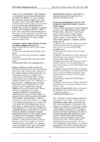Identificador persistente para citar o vincular este elemento:
https://accedacris.ulpgc.es/jspui/handle/10553/70844
| Título: | Occurrence and pathologies associated with foreign body ingestion in stranded cetaceans, Canary Islands | Autores/as: | Puig Lozano, Raquel Patricia Bernaldo de Quirós Miranda, Yara Díaz-Delgado, Josué García Álvarez, Natalia Sierra Pulpillo, Eva María De La Fuente Marquez, Jesus Sacchini, Simona Suárez-Santana, Cristian Zucca, Daniele Câmara, Nakita Saavedra Santana, Pedro Almunia Portolés, Francisco Javier Rivero Santana, Miguel Antonio Fernández Rodríguez, Antonio Jesús Arbelo Hernández, Manuel Antonio |
Clasificación UNESCO: | 310907 Patología | Palabras clave: | Cetaceans Canary Islands Foreign body ingestion Ingestión cuerpos extraños |
Fecha de publicación: | 2020 | Conferencia: | World Marine Mammal Conference (WMMC 2019) | Resumen: | One of the major concerns in aquatic environment is the impact of marine litter. Plastic is the most prevalent item within marine litter and not only affects the chemical quality of the water but also impacts marine organisms. Currently, the presence of debris ingestion has been reported all over the world in different marine species, though little is known in cetaceans. In this research, we study the occurrence and pathologies associated with the presence of foreign bodies (FB) in stranded cetaceans in the Canary Islands during a sixteen years period (n = 465). Fifteen species were affected by FBs including eight out of the nine year-round species in the archipelago. A total of 36 individuals (7.74%; 36/465) presented at least one FB, being plastic the most common item found (80.56%). Deep divers were the most affected group with Grampus griseus as the most affected species followed by Physeter macrocephalus and beaked whales. Two individuals of baleen whales were also affected (Balaenoptera physalus and B. acutorostrata). Ingestion of debris was lethal in 36.11% (13/36) of the cases presenting lesions such as stomatitis, bleeding ulcers, gastritis, perforations and impactions. As previous reports, no lesions were found in ten individuals which presented ingested FB. This is the first forensic study that, based on statistical analysis, define two risk factors for FB ingestion (poor body condition and deep diving behavior) and a protective factor (adult age). | URI: | https://accedacris.ulpgc.es/handle/10553/70844 | Fuente: | World Marine Mammal Conference 2019, p. 577-578 |
| Colección: | Actas de congresos |
Visitas 1
150
actualizado el 10-ene-2026
Descargas
14
actualizado el 10-ene-2026
Google ScholarTM
Verifica
Comparte
Exporta metadatos
Los elementos en ULPGC accedaCRIS están protegidos por derechos de autor con todos los derechos reservados, a menos que se indique lo contrario.
